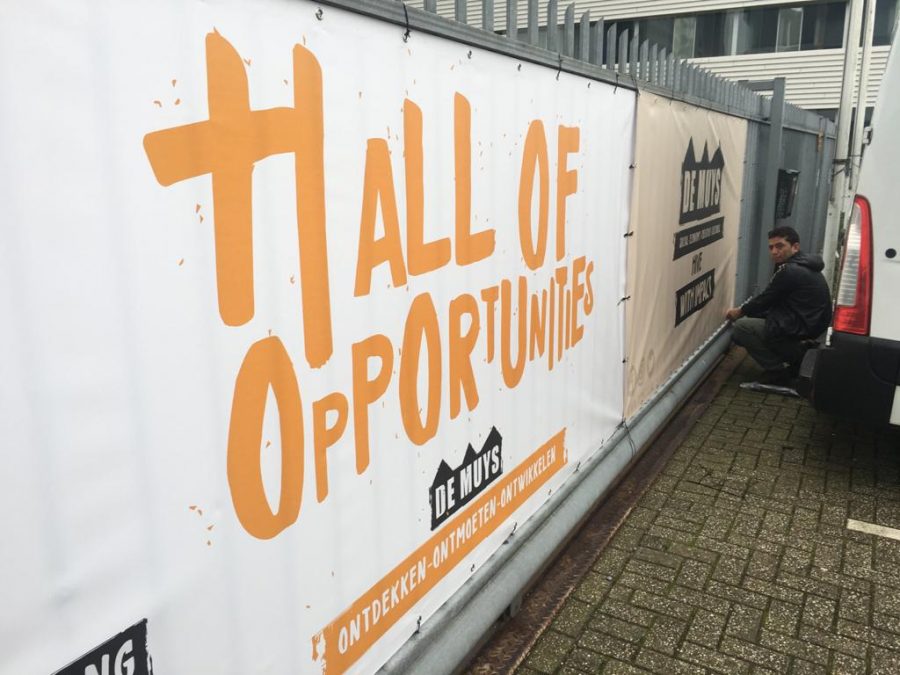What is broken can be repaired and only become more beautiful and stronger. This philosophy underlies the Japanese art form Kintsugi. Broken shards are glued together with gold to help remember that the process of repair can lead to more beautiful, strong and unique results. In the Hall of Opportunity we follow the same philosophy. The gold is present in the development of the young people, the crafts that they refurbish and sell.
Broken pieces to a beautiful work
Isolated, little social contact and no basic qualification. The lack of work and opportunities can eventually gnaw at the self-image and confidence of young people. The boredom, hopelessness and problems that result can lead to depression, addiction and even crime. To help these young people, intensive and accessible support is needed. The Hall of Opportunity is a social workplace that gives them the space to get out of their heads, work with their hands and connect with others. In the Hall, furniture and craft pieces are restored, improved, increasing their value for sale. Under the guidance of a teacher, young people become students of a BBL training in which they receive practical lessons in empowerment and traditional entrepreneurship 4 days a week. Also to them on sniffing internship and on mandatory community service in which the skills are further developed.
To forge gold you must first mine it and target
Hall of Opportunity loses out. It mainly concerns young people in the age category between 16 and 25 years, without a basic qualification and at a distance from the labor market. The current economic crisis and the effect of exclusion mechanisms associated with prejudice and discrimination make it extra difficult for them to find paid work.
In addition to transforming the pieces of furniture, the students also undergo a transformation. The students receive a program consisting of a series of hands-on workshops on two topics: empowerment and artisanal entrepreneurship. They also follow a BBL training in which they gain practical experience for a number of days and go to school for one day each week. On the basis of an apprenticeship contract, they perform work to gain work experience at the sniffing internships. In other workshops they spend a few days working on assignments on the spot. At the end of the internships, the findings are discussed with the student during a meeting in the presence of a representative of the workshop and a work master.
The empowerment sessions emphasize personal development. Topics such as self-awareness, positive thinking, self-reliance, communication and presentation are discussed here. Students are invited to reflect on who they are, what they find important and how they communicate. Communication training, coaching and personal support is then offered to achieve the aim of the workshops: to increase the self-confidence and social skills of the students. This also includes personal guidance and coaching in the field of education and work and, if necessary, in their private situation. In order to match the student’s environment as closely as possible, discussions are also held with the parents and mentors at school.
The artisanal entrepreneurship workshops are practical sessions on entrepreneurial competences. The students learn interactively about topics such as supply and demand, customer service, PR and communication and budgeting. Special attention is paid to creativity and plan development. Concepts are developed in brainstorming sessions and they learn to think out of the box. The aim of these workshops is to increase their entrepreneurial competences and their affinity with craft orphans.
In short, students are stimulated with the workshops, supervision and introductory internships to actively contribute to their own development on the basis of individual and collective assignments.
Community with a golden edge
The Hall of Opportunity is part of the Muys hive where entrepreneurship, development and collaboration are valued and facilitated.
In addition to the sniffer internship, students are also required to carry out social activities to improve social skills and promote cooperation. The community service consists of activities such as performing prick campaigns, organizing football tournaments and visiting the elderly in a nursing home. By meeting, exchanging knowledge, experience and ideas, various groups such as the elderly, young people, but also companies and other stakeholders can seek connections with others and develop new initiatives. These initiatives can lead to new opportunities for young people. But this can also be meaningful for the elderly, for example.
Finally, the layout and design of the workshop also takes the community into account. This is adapted to the wishes and needs of the customers and our students. There is a canteen, a coffee house where all products that have been made or refurbished are displayed. The workplace and social environment improve the well-being of young people and help them prepare for the next step towards education or work. With their participation, the students are a community with a just do it mentality.

 Nederlands
Nederlands